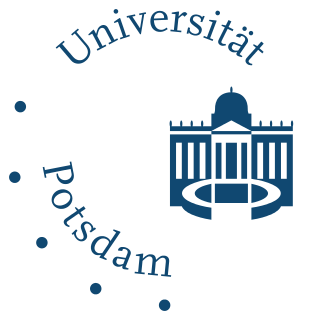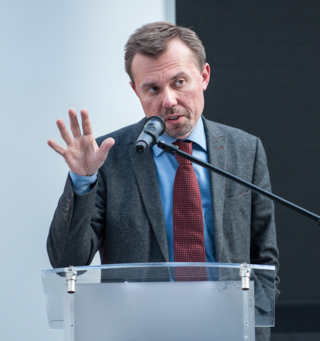Related Research Articles

Interdisciplinarity or interdisciplinary studies involves the combination of multiple academic disciplines into one activity. It draws knowledge from several fields like sociology, anthropology, psychology, economics, etc. It is related to an interdiscipline or an interdisciplinary field, which is an organizational unit that crosses traditional boundaries between academic disciplines or schools of thought, as new needs and professions emerge. Large engineering teams are usually interdisciplinary, as a power station or mobile phone or other project requires the melding of several specialties. However, the term "interdisciplinary" is sometimes confined to academic settings.

The University of Freiburg, officially the Albert Ludwig University of Freiburg, is a public research university located in Freiburg im Breisgau, Baden-Württemberg, Germany. The university was founded in 1457 by the Habsburg dynasty as the second university in Austrian-Habsburg territory after the University of Vienna. Today, Freiburg is the fifth-oldest university in Germany, with a long tradition of teaching the humanities, social sciences and natural sciences and technology and enjoys a high academic reputation both nationally and internationally. The university is made up of 11 faculties and attracts students from across Germany as well as from over 120 other countries. Foreign students constitute about 18.2% of total student numbers.

The University of Bremen is a public university in Bremen, Germany, with approximately 18,400 students from 117 countries. It is one of 11 institutions which were successful in the category "Institutional Strategies" of the Excellence Initiative launched by the Federal Government and the Federal States in 2012. The university was also successful in the categories "Graduate Schools" and "Clusters of Excellence" of the initiative.

Bielefeld University is a public university in Bielefeld, Germany. Founded in 1969, it is one of the country's newer universities, and considers itself a "reform" university, following a different style of organization and teaching than the established universities. In particular, the university aims to "re-establish the unity between research and teaching", and so all its faculty teach courses in their area of research. The university also stresses a focus on interdisciplinary research, helped by the architecture, which encloses all faculties in one great structure. It is among the first of the German universities to switch some faculties to Bachelor/Master-degrees as part of the Bologna process.

The University of Erlangen–Nuremberg is a public research university in the cities of Erlangen and Nuremberg in Bavaria, Germany. The name Friedrich–Alexander is derived the university's first founder Friedrich, Margrave of Brandenburg-Bayreuth, and its benefactor Alexander, Margrave of Brandenburg-Ansbach.

The University of Erfurt is a public university located in Erfurt, the capital city of the German state of Thuringia. It was founded in 1379, and closed in 1816. It was re-established in 1994, three years after German reunification. Therefore, it claims to be both the oldest and youngest university in Germany. The institution identifies itself as a reform university, due to its most famous alumnus Martin Luther, the instigator of the Reformation, who studied there from 1501 to 1505. Today, the main foci centre on multidisciplinarity, internationality, and mentoring.

The University of Tsukuba is a national research university located in Tsukuba, Ibaraki, Japan.

The University of Potsdam is a public university in Potsdam, capital of the state of Brandenburg, northeastern Germany.

Abraham Shalom Yahuda was a Jewish polymath, teacher, writer, researcher, linguist, and collector of rare documents.

The German Institute for Global and Area Studies, also known as GIGA, is a German research institute. It analyses political, economic, and social developments in Africa, Asia, Latin America, as well as the Middle East. It combines its analysis with comparative research on international relations, development and globalisation, violence and security, and political systems. GIGA researchers are sought after by policymakers to advise Germany's Federal Foreign Office, members of Parliament and other branches of the German federal government. The institute is based in Hamburg and has an office in Berlin.

The John F. Kennedy Institute for North American Studies (JFKI) is a central institute at Freie Universität Berlin. The JFKI was founded in 1963 by Ernst Fraenkel, a political scientist and was named in the honor of John F. Kennedy after his assassination. It is considered one of the world's foremost centers surrounding the study the United States.

The Pembroke Center for Teaching and Research on Women is an interdisciplinary research center focused on gender and women at Brown University, Providence, Rhode Island. It was established in 1981. In addition to research, the center is home to archives of feminist theory and women's history as well as Brown's undergraduate Gender and Sexuality Studies concentration. Postcolonial theorist Leela Gandhi, is the Center's director, having assumed the position in July 2021.
Stanford University has many centers and institutes dedicated to the study of various specific topics. These centers and institutes may be within a department, within a school but across departments, an independent laboratory, institute or center reporting directly to the dean of research and outside any school, or semi-independent of the university itself.
Columbia Global Centers are research outposts established by Columbia University in different locations around the world, as part of its initiative to further establish an international research university. The first of these centers opened in March 2009 in Beijing, China, and Amman, Jordan, and Columbia opened facilities in Paris, France, and Mumbai, India, in March 2010 and Istanbul, Turkey in November 2011. Locations in Nairobi, Rio de Janeiro and Santiago de Chile were opened in 2012 and 2013. An additional location in Tunis opened in 2018.

Leibniz-Zentrum Moderner Orient (ZMO) is a German research institute located in Berlin, Germany. The researchers focus on a comparative and interdisciplinary study of the Middle East, Africa, Eurasia, South and Southeast Asia. Central to its current research topics is the study of predominantly Muslim societies and their relations with non-Muslim neighbours. ZMO was founded in 1996 as an independent centre for the humanities, cultural and social sciences and is situated in the “Mittelhof”, which was designed by Hermann Muthesius, in Berlin-Nikolassee. Under the directorate of de:Ulrike Freitag, the centre is part of the association “Geisteswissenschaftliche Zentren Berlin e.V.”. The research programme has been funded by the Berlin Senate, the Deutsche Forschungsgemeinschaft (DFG) and the German Ministry for Education and Research. Since January 1, 2017 ZMO is part of the Leibniz Association.
The University of Maryland, Baltimore County (UMBC) features a variety of research centers and institutes both based on the campus and affiliated with other academic institutions. These centers and institutes listed below seek out to expand their research, educate, and promote partnerships between the university and the Baltimore-Washington Metropolitan Area and beyond.
Donna Rae Gabaccia is an American historian who studies international migration, with an emphasis on cultural exchange, such as food and from a gendered perspective. From 2003 to 2005 she was the Andrew Mellon Professor of History at the University of Pittsburgh and from 2005 to 2012 she held the Rudolph J. Vecoli Chair of Immigration History at the University of Minnesota. During the same period, she was the director of the Immigration History Research Center at the University of Minnesota. In 2013, her book, Foreign Relations: Global Perspectives on American Immigration won the Immigration and Ethnic History Society's Theodore Saloutos Prize in 2013.
Mona Kareem is an Arab-American writer, translator, and literary scholar, as well as an advocate for migrant rights. Born in Kuwait to a stateless, or Bedoon, family, the theme of statelessness is prevalent in her literary work.

Andrii Portnov is a Ukrainian historian, essayist, and editor. He is the chair professor of entangled history of Ukraine at the European University Viadrina in Frankfurt (Oder). and a director of the PRISMA UKRAЇNA Research Network Eastern Europe. He specializes in Polish-Russian-Ukrainian history and memory studies.
Rachid Ouaissa is a German-Algerian academic and, since 2009, a professor at the University of Marburg. He heads the department “Politics of the Near and Middle East” at the Center for Near and Middle Eastern Studies.
References
- ↑ "Forum Transregionale Studien: MECAM" (in German). Retrieved 4 December 2024.
- ↑ "Forum Transregionale Studien" (in German). Retrieved 4 December 2024.
- ↑ "Official Website" . Retrieved 4 December 2024.
- ↑ "Flyer" (PDF). Forum Transregionale Studien (in German). Retrieved 4 December 2024.